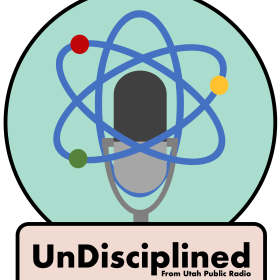
UnDisciplined
Thursdays at 10:30 a.m.
Each week, UnDisciplined takes a fun, fascinating and accessible dive into the lives of researchers and explorers working across a wide variety of scientific fields.
-
The wildfires in Southern California are on track to become the costliest disaster in U.S. history, and a lot of people are already recognizing that this conflagration is going to send a shockwave through the insurance market. But, as it turns out, the economic impact won’t stop there. Wesleyan University economist Gary Yohe says that the fires have the potential to be a contagion that sends a sickness through the system.
-
David Roberts clearly isn’t happy about the political direction of this country especially as it pertains to climate. But if you read his newsletter and listen to his podcast, you’ll realize that there are still a lot of cool people, doing cool stuff, with a chance to cool our world.
-
Rep. Kera Birkeland spent much of her political career writing and passing legislation aimed at trans Americans — legislation that many people view as cruel. And Birkeland most recent electoral opponent, Kris Campbell, says Birkeland’s actions and words have caused trans people like him to feel fear, anxiety and anger. But while many people have responded to Campbell with contempt, Birkeland has publicly called for grace.
-
Social psychologist Nilanjana Dasgupta says our bottom-up approach to DEI training is likely ineffective, but there are simple, straight-forward and research-based steps that actually work to create more equitable institutions.
-
A much publicized warning released in the winter of 2023 said that the Great Salt Lake was at grave risk of disappearing in only five years. Two very wet winters later, it’s now very clear that the worst case scenario is not going to happen. So…what changed?
-
A much publicized warning released in the winter of 2023 said that the Great Salt Lake was at grave risk of disappearing in only five years. Two very wet winters later, it’s now very clear that the worst case scenario is not going to happen. So…what changed?
-
A much publicized warning released in the winter of 2023 said that the Great Salt Lake was at grave risk of disappearing in only five years. Two very wet winters later, it’s now very clear that the worst case scenario is not going to happen. So…what changed?
-
In hindsight, it’s clear that a century of suppressing wildfires probably hasn’t made us safer in the U.S. West. But knowing what doesn’t work isn’t the same as knowing what does. So what do we do?
-
There are two pretty simple questions that Allison Agsten wanted to have answered as she assumed the directorship of the Center for Climate Journalism and Communication at the University of Southern California: First, how do climate communicators get their information about climate? And then, what do they think the biggest challenges are when it comes to communicating about climate change?
-
The most obvious health risk in a warming world is heat — heat stress which can cause heat stroke, which can cause dehydration, which can cause kidney failure, and so on. But that’s not where the intersections between climate change and public health begin or end. And Heidi Honegger Rogers believes that we all need to better understand what’s happening and what is to come.










